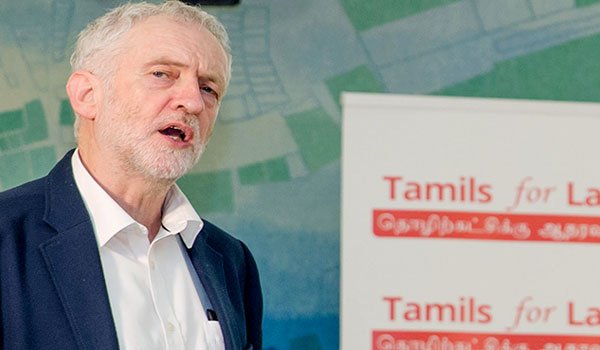After being received with a standing ovation at a meeting of the Labour party with Tamil community in the Houses of Parliament, Mr Jeremy Corbyn in his concluding remarks said,
“We as a party are very committed to the issues of human rights and justice. We are very committed to the rights of peoples, Tamil people, in this case, to achieve their justice, their self-expression and their self-determination.”
Addressing the meeting, organised by Tamils For Labour, Mr Corbyn questioned whether the conflict in Sri Lanka is actually over, adding,
“This is the seventh anniversary of the end of the conflict or is it the end of the conflict? You have to go into the question of the human rights abuses, the camps that were set up, the missing people, the lack of journalists and independent observers, and about the issue being properly being taken up at the UN. Those issues have to be dealt with. Unless you solve the issue of the rights of people for their cultural identity, their rights, their language, their freedom, their ability to organise themselves as a community, then the war is not over, the conflict is not over. The situation will only rear its head again. Thousands have died during that war, thousands have lost their lives and families have suffered. Do we say it’s all over? No we don’t.”
Stressing the importance of upholding human rights irrespective of trade relations, he added,
“When it comes to trade treaties.. they must include a very clear definition of what human rights abuses are. If the trade partner is abusing human rights…then quite simply, we should not be treating them as a normal equal trading partner, we should put all the demands and pressure wed put for anybody else where there is abuse of rights going on. We as a party are very committed to the issues of human rights and justice. We are very committed to the rights of peoples, Tamil people, in this case, to achieve their justice, their self-expression and their self-determination.”
Mr Corbyn went on to reflect on his longstanding involvement in the Tamil struggle and disappointment at the international community to act on Tamil demands.
Speaking of his experiences in dealing with Asylum cases during the 1983 riots in Sri Lanka, and the May 2009 protests, he said,
“When I was first elected to parliament, before recorded history began, in 1983, there was a useful rule that any MP could take up any immigration case in the country wherever it was. So every MP had the power to intervene on behalf of an asylum applicant to make representations to the home office. Because of the of work volunteers that did hundreds of cases As a result of this hard work, A very large number of people were not deported to Sri Lanka in 1983, 84 and 85. And were able to remain in this country, build their lives, run their businesses and be active in Tamils for Labour.”
“When we had the camp in parliament square, people were taking hunger strikes to draw attention to the situation in Sri Lanka. 200,000 people marched through the streets of London and I was one of very few people who were not part of the Tamil community to join that march. I remember to this day, and am still angry about it, the utter silence of the majority of British and world’s media to the demonstration as well as the cause on the issue. The meeting tonight draws attention to the abuse of human rights and attention to the demands you are making. I hope Tamils for Labour continue ensuring that we as a party remain committed to the needs and justice for the Tamil people.”
(Tamil Guardian)






